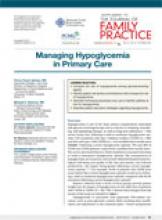User login
Article Type
Changed
Display Headline
Managing Hypoglycemia in Primary Care
Sponsor
This supplement was sponsored by the Primary Care Education Consortium and the …
Article PDF
Issue
The Journal of Family Practice - 61(10)
Topics
Page Number
S1-S8
Sections
Article PDF
Article PDF
Sponsor
This supplement was sponsored by the Primary Care Education Consortium and the …
Sponsor
This supplement was sponsored by the Primary Care Education Consortium and the …
Issue
The Journal of Family Practice - 61(10)
Issue
The Journal of Family Practice - 61(10)
Page Number
S1-S8
Page Number
S1-S8
Topics
Article Type
Display Headline
Managing Hypoglycemia in Primary Care
Display Headline
Managing Hypoglycemia in Primary Care
Sections
Disallow All Ads
Alternative CME
Consolidated Pubs: Do Not Show Source Publication Logo
Use ProPublica
Article PDF Media
Document

